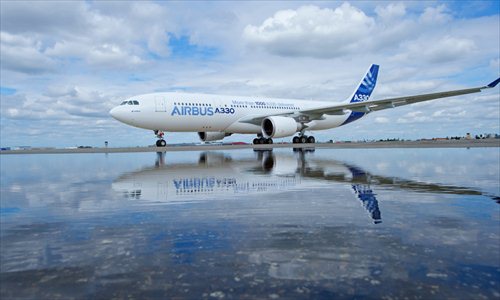
(Photo/Courtesy of Airbus)
In one week, the world's two largest aircraft manufacturers reported record deliveries in 2015, as China continues to be one of their most important markets, despite its slowing economy.
Boeing Co said it delivered 762 commercial aircraft in 2015, 39 more than in 2014 and most ever for the company as it enters its centennial year.
Its rival Airbus SA said it has exceeded its 2015 targets, delivering a record 635 aircraft, most of which are in the A320 family. The France-based aircraft maker delivered the planes to 85 customers, of which 10 are new.
The senior executive of each company attributed the growth to robust worldwide demand for air travel, with their performance in 2015 laying a strong foundation for the future.
"We don't speculate about the ups and downs of the stock market and currency market. However, we are confident in the sustainable development of Chinese economy and aviation industry," said Eric Chen, Airbus China president and CEO.
China continues to be an important market for Airbus. More than 1,230 Airbus aircraft, including 170 A330s, were operating on the Chinese mainland in 2015.
"The Chinese market in next five years could develop faster than the previous five years," Darren Hulst, managing director of Northeast Asia Marketing with Boeing Commercial Airplanes, told the Global Times on Thursday.
However, the slowdown of Chinese economy has worried investors.
China's economic planning agency warned on Tuesday that 2016 will be a difficult year for the country's economy, even though it estimated GDP growth of around 7 percent for 2015.
The domestic aviation industry continues to be driven by overall economic growth, urbanization, the emerging middle class and China's "Belt and Road" initiative, Chen said in a note sent to the Global Times on Wednesday. "The fundamentals for the Chinese aviation industry remain strong," Chen noted.
The elements of GDP related to aviation are growing fast. In addition, looser visa policies for Chinese overseas travelers have also been a boon to the already booming travel market.
"China's international growth is just beginning," Hulst said.
Hulst said in 2015, the capacity of Boeing 787 in and out of China including international carriers has increased 60 percent in the long haul market, connecting more cities including secondary markets in China.
And the 777-300ER (Extended Range) also plays an key role in long haul growth as China's big three airlines are using the model in their long haul expansions.
In addition, both Boeing and Airbus have continued to make cooperating with China a priority.
In 2015, when President Xi Jinping visited Boeing headquarters in the US, the company announced it had received 300 aircraft orders from Chinese customers. It also announced it will work with COMAC, the producer of China's home-made C919, to complete a factory for 737s, its first assembly plant out of the US.
Airbus said the company will hold a ground-breaking ceremony for the A330 Completion and Delivery Centre in Tianjin early this year, another milestone following the A320 Family FAL in Tianjin.
In 2016, Airbus will increase production of its A320 family, including the A320neo.
Airbus said it believes China will become the leading country for both domestic and international passenger air traffic as its domestic passenger traffic will grow well above the world average.
More orders are on the way. Earlier this month, Air China placed an order with Boeing for six additional 777-300ER jetliners. The order was valued at $2.05 billion, based on current list prices.
Regarding the order, Airbus surpassed its rival, as at 2015 year-end the overall backlog had climbed to a record of 6,787 aircraft valued at $996.3 billion at list prices, but Boeing held 5,795 unfilled orders from customers worldwide at year end.
In 2015 alone, Boeing won a net order of 768 and 1,036 for Airbus, compared with 1,432 and 1,456 separately.
Hulst noted Boeing's orders have remained high over the last few years, and it is impossible to have high orders every year. And it still take years to complete all the previous orders, he said.


















































